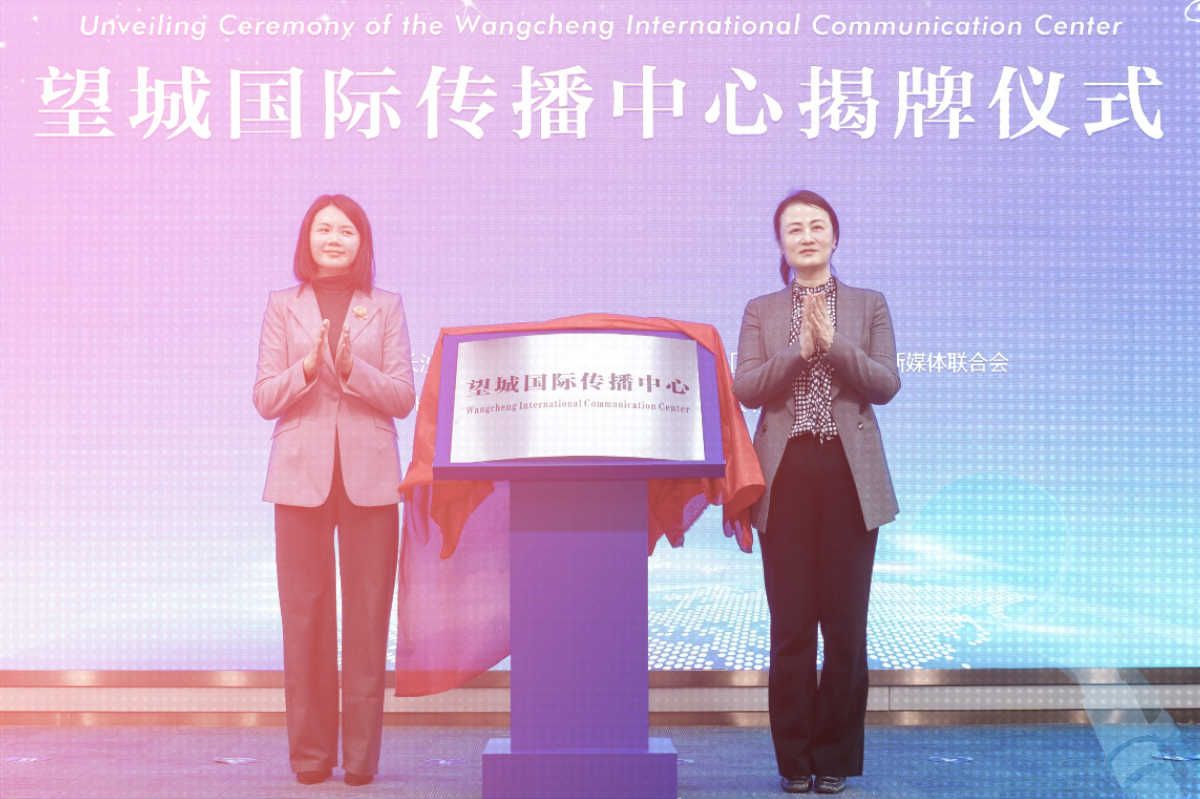China Newspeak
The Emperor's New Buzzword
As the immediacy of the Covid-19 crisis has faded in China, the focus in the media coverage has turned to “the return to work and return to production” (复工复产). In the party-state media, the aggrandizing attention paid to Xi Jinping as the “leader,” or lingxiu (领袖), which cooled noticeably in February and March, is also now heating up once again.
When we look at the frequency of the phrase “two protections” – referring to the protection of Xi Jinping as the CCP’s “core,” and protection of the authority of the Central Committee – counted on a per-article basis in the Party’s flagship People’s Daily newspaper from December 2019 through May 2020, here is the trend we can see:
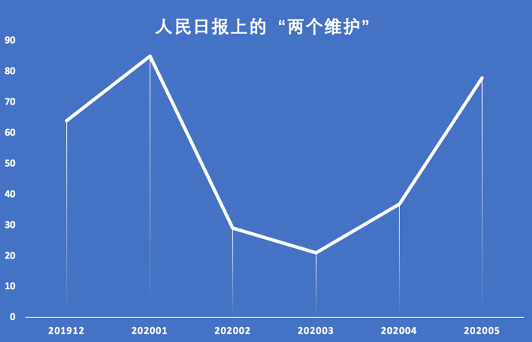
Clearly, the “two protections” has returned almost to the January high, which came before Xi Jinping’s open acknowledgement of the severity of the epidemic on January 20. The “two protections” is a phrase that, like the designation “core” and other related terms, clearly marks the power and authority of Xi Jinping as general secretary — and its resurgence, more than doubling from April to May, is significant.
But there is another term, perhaps less known to readers, that also deserves attention, and that is the phrase, rather unwieldy in English, “Green waters and green mountains are gold mountains and silver mountains” (绿水青山就是金山银山). What does this mean? In fact, this phrase is a personal favorite of Xi’s. During his official visit to Kazakhstan on September 7, 2013, he gave a speech at Nazarbayev University and answered questions from students about environmental protection. He said: “We want green waters and green mountains, but we also want gold mountains and silver mountains. It is better to have green waters and green mountains than gold mountains and silver mountains – and green waters and the green mountains are gold mountains and silver mountains.”
This is Xi Jinping’s more colorful way of saying that while economic development is a priority, the environment cannot be sacrificed for the sake of growth. State media have suggested repeatedly in recent years that the phrase has been welcomed internationally, and that it has “contributed Chinese knowledge and a Chinese solution” to global environmental problems. In fact, the phrase is difficult to convey in other languages, and it seems to have gained little or no traction outside China.
But the phrase rings well enough in Chinese, and it has been tolling steadily in the party-state media of late. When we look at the development of this phrase since late last year in the People’s Daily, here is what we find:
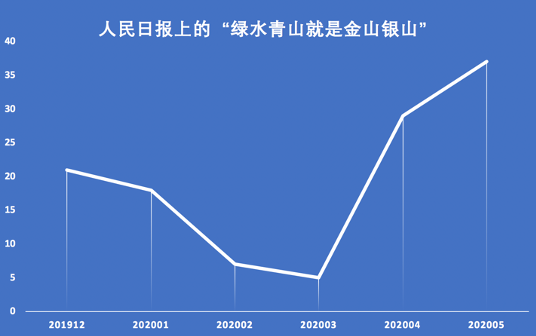
Over the past month the phrase has been further developed, shortened into what is now being called the “two mountains theory,” or liangshanlun (两山论). The following is an image of coverage last week from Xinhua News Agency. The headline reads: “Xi Jinping’s ‘two mountains theory’ allows the world to understand ‘beautiful China.’”
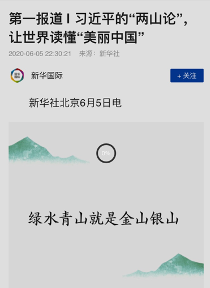
Reading the now abundant explications of this phrase and its shortened version in the party-state media, we are clearly told that the “two mountains theory” is an original creation of Xi Jinping’s. Back in March, in the midst of the epidemic, Xi paid a visit to Anji County in Zhejiang province, where from 2002 to 2007 he served as governor and Party secretary. Media reports stressed the claim that Xi was returning to the place where the “two mountains theory” was first conceived.
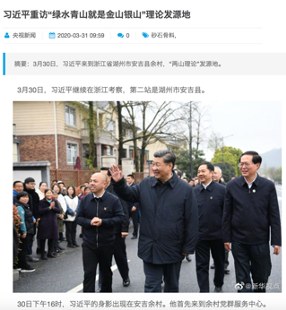
Several online sources, including the Chinese-language Wikipedia, suggest that Xi Jinping first raised the “two mountains theory” on August 15, 2005, during an inspection tour as provincial secretary of Zhejiang’s Anji County, and that it is “the principal theory guiding the building of an ecological civilization in mainland China.”
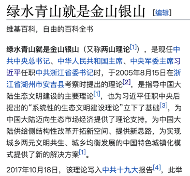
Environmental protection is regarded as an important agenda for the CCP on which there is a rather high level of consensus within the Party. The recent upsurge in coverage of the “two mountains theory” appears to be part of a new round of propaganda surrounding the notion of Xi as the lingxiu (领袖), or “leader,” this time focussing on what has also been termed “Xi Jinping thought on ecological civilization” (习近平生态文明思想).
The Chinese phrase, “Green waters and the green mountains are gold mountains and silver mountains,” is rather vivid, and one might argue lends itself to wider circulation, at least in Chinese. But where did the phrase actually come from? And in what context was it first raised by Xi Jinping?
Searching in the People’s Daily for the separate phrases “green waters and green mountains” and “gold mountains and silver mountains,” we can unearth the following front page from the newspaper dating back to March 9, 2003.
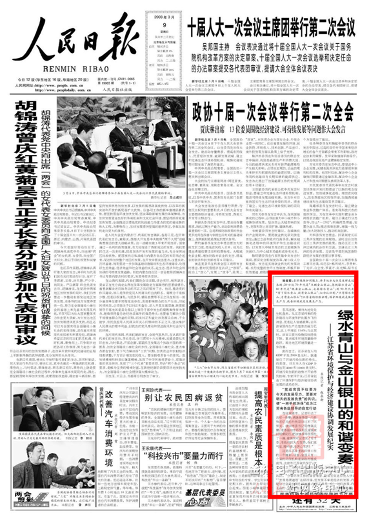
The headline highlighted in red reads: “Variations on green waters-green mountains and gold mountains-silver mountains.” The subhead to the left of the main headline tells us that this is about environmental policies in Jiangsu province, Zhejiang’s northern neighbour, and the concept sounds eerily similar: “A record of the coordination of environmental protection and economic development in Jiangsu province.”
Here is my translation of the editor’s note that starts out the article:
On the question of environmental protection, many regions have had this general experience: The 1970s ‘only prioritized gold mountains and silver mountains, overlooking green waters and green mountains’; The 1980s were about ‘demanding gold mountains and silver mountains, and also wanting green waters and green mountains’; In the 1990s the sense was that ‘having green waters and green mountains meant having gold mountains and silver mountains [to exploit]’; and lately we have recognized that ‘only by having green waters and green mountains can we have gold mountains and silver mountains!’”
Looking back ever further, similar phrasing appears in 1995, way back in the Jiang Zemin era. In an article appearing in the People’s Daily on November 2, 1995, the CCP leadership in the Jiangsu county of Zhangjiagang (张家港) wrote: “[We] need gold mountains and silver mountains, and we also want green waters and green mountains” (既要金山银山, 又要绿水青山).
In 1996 and 1997, in fact, quite of number of instances in which variations of this idea (of needing but also wanting, and so on) appear in headlines in the People’s Daily. These come, among others, from the county-level city of Fuyang in Zhejiang province (July 31, 1996); from Jiangsu’s Party secretary Chen Huanyou (陈焕友), appearing November 18, 1996; and from Shaanxi primary school teacher Yu Yingkai (于应凯).
On June 8, 1998, an article from the city government of Zhongshan in Guangdong province stated that, “[We] want green waters and green mountains, not polluted gold and silver mountains.” In another article appearing on July 15, 1998, the district government of Taishan in the city of Tai’an in Shandong province offered: “Gold mountains and silver mountains cannot compare to green waters and green mountains.”
Zhejiang province is regarded in China as being at the forefront of environmental protection. In 1999, the People’s Daily reported that President Jiang Zemin had written words of dedication for the village of Tengtou in Fenghua, near the city of Ningbo. Those words read: “We would rather have green waters and green mountains, even without gold mountains and silver mountains” (August 24, 1999).
In the 1990s, as green waters and green mountains were bandied about in the People’s Daily, there was no sign of such language from Fujian province, where Xi Jinping was serving in various posts, eventually becoming governor in 1999. It was only later, in 2002, that Xi would be transferred to “green” Zhejiang, becoming Party secretary there in November that year.
Before and shortly after Xi’s arrival in Zhejiang, there were already several provincial Party secretaries talking about the “two mountains” in the pages of the People’s Daily. On June 10, 2002, then Hubei Party Secretary Yu Zhengsheng (俞正声), who served on the Politburo Standing Committee with Xi from 2012 to 2017, said: “Only if we have green waters and green mountains can we have gold mountains and silver mountains.”
On March 5, 2003, then Jiangxi Party Secretary Meng Jianzhu (孟建柱), who was secretary of the CCP’s Central Political and Legal Affairs Commission before retiring in 2017, said: “We want green waters and green mountains, but we want even more gold mountains and silver mountains.”
But even more than these near-hit utterances, coming so close in meaning to the current “two mountains theory” being so loudly propagated as Xi Jinping’s own creation, we should note a People’s Daily report on October 24, 2003, in which the then director of the Ministry of Environmental Protection (MEP), Xie Zhenhua (解振华), said: “Green waters and green mountains are gold mountains and silver mountains!” (绿水青山就是金山银山). Here we have concrete evidence in the press records of the Chinese Communist Party that the so-called “two mountains theory” had already been codified by October 2003, and in fact emerged in full form that year from the government ministry tasked with protecting China’s water, land and air from pollution. The department is now known as the Ministry of Ecology and Environment.
When did Xi Jinping first come into the picture? To answer this, we must fast-forward almost a year, to August 10, 2004. We find Xi, then Party secretary of Zhejiang, quoted in a People’s Daily article referencing the “Three Represents” and the “Scientific View of Development,” the banner terms respectively of Jiang Zemin and Hu Jintao. The article deals with a campaign in Zhejiang to clean up polluted villages, and reads at one point:
Zhejiang provincial Party leaders excitedly told the reporter: “The ‘1,000 Model Villages, 10,000 Renovated Villages’ Project, as an ‘ecological project,’ is an effective means of promoting the building at an ecological province, and it protects the ‘green waters and green mountains’ while bringing ‘gold mountains and silver mountains.’”
There is also a direct quote from Xi, in which he says: “We take the carrying out of this program as real action toward the realization of the ‘Three Represents,’ and the implementation of the scientific view of the development.”
Finally, on April 24, 2006, the People’s Daily reported on a speech on the environment delivered by then Zhejiang Party Secretary Xi Jinping to a provincial government conference on the issue. This is the first time we see the so-called “two mountains theory” closely associated with Xi in any context.
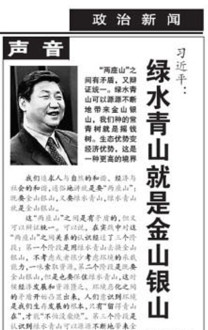
In this article, Xi says that the “two mountains” stand in contradiction, yet are “dialectically integrated.” Green waters and green mountains can unceasingly provide a source of gold mountains and silver mountains, he says. Ecological advantages can be turned into economic advantages – and this, he suggests, is the highest aspiration. There must be harmony between man and nature, and harmony between the economy and society. These are what he calls the “two mountains.” The article reads: “We want gold mountains and silver mountains, but we also want green waters and green mountains; green waters and green mountains are gold mountains and silver mountains.”
Explaining this “two mountains” notion at the time, Xi spoke of three stages. In the first stage, green waters and green mountains are exploited for gold and silver mountains. In the second stage, economic development is the priority, but the environment (the green waters and mountains) are to be protected. In the third stage, there is finally a recognition that environmental health is the constant source of economic prosperity – of those mountains of gold and silver. The third stage, he says, is the pinnacle of development.
Once we’ve put all of the above materials together, we can clearly see the development of the idea behind this phrase, “Green waters and the green mountains are gold mountains and silver mountains.” Xi Jinping is fond of saying that “each generation builds in its work on the last” (一代人接着一代人干). In fact, this is true also of discourse. This phrase originally came to maturity within the context of the nationwide propagation of Hu Jintao’s “scientific view of development” well over a decade ago.
It was only after several senior provincial leaders and central government officials made quite prominent and unmistakable pronouncements on this very concept and phrasing that Xi Jinping jumped on the bandwagon.
If we talk about the “two mountains theory” as a cumulative idea, then we can say that Xi Jinping has made two contributions in particular. The first is to tidy up the language around the “two mountains” with his 2006 People’s Daily article, which sums up and clarifies the idea. The second is to offer the “two mountains” concept his backing as a senior leader, giving it a much higher national profile. Though Chinese party-state media would have us also believe that the concept has had great impact internationally, that the world has greeted the concept, as the China Daily reported, with “a high-level of attention and expectation,” there in fact little mention of the phrase at all outside Chinese.
But the more crucial point here is that Xi Jinping is not the originator of this concept, not by a long shot.
We can note that the phrase, “We want green waters and green mountains, and also gold mountains and silver mountains,” which Xi included in his speech at Nazarbayev University, appears verbatim in the Jiang Zemin era. The phrase, “We would rather have green waters and green mountains, even without gold mountains and silver mountains,” was raised in the village of Tengtou, near Ningbo, in 1999, at which time Xi had not yet arrived in Zhejiang. The phrase, “Green waters and the green mountains are gold mountains and silver mountains,” which has been loudly trumpeted as a Xi neologism in recent weeks, was uttered nearly 16 years ago by the director of the Ministry of Environmental Protection, Xie Zhenhua.
Is there any need to imagine, and involve the entire country in the fiction, that this phrase is a theoretical innovation of Xi Jinping himself?
Officials in the Chinese Communist Party have developed the habit through long practice of this sort of collective aggrandizement. In the face of rising tides of leadership admiration, and incipient personality cults, the threshold of praise gets pushed ever higher, until facts are no longer material.
CCP history records how, in 1922, Li Lisan (李立三) and Liu Shaoqi (刘少奇) led a major strike among miners in Jiangxi’s Anyuan Township. In 1961, a Chinese painter made an oil painting called, “Liu Shaoqi and the Miners of Anyuan” (刘少奇与安源矿工), and Li Lisan, who by that point had been disgraced within the Party, was omitted from the portrait. But the vicissitudes of politics under Mao Zedong meant the tiles were soon shuffled again. As the Cultural Revolution got underway, and as Liu Shaoqi was purged and subjected to harsh treatment, another painting of Anyuan was created. This time, Liu Shaoqi was changed out for Mao Zedong, and the painting naturally called, “Mao Zedong En Route to Anyuan” (毛主席去安源).
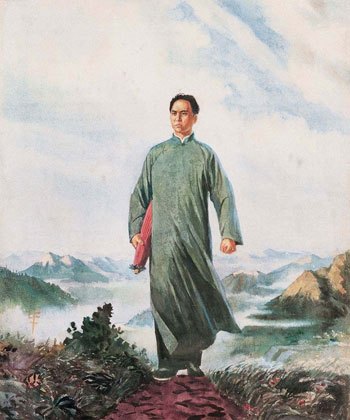
There are many other examples of this kind, of the facts being twisted, expunged, painted over and glossed over – all in order to make way for the CCP’s predominating sense at the moment of how things should be.
Clearly, when online sources and party-state media suggest that the “two mountains” theory was raised by Xi Jinping during an inspection tour of Zhejiang’s Anji County in 2005, and the suggestion is made on national television that Anji is “the place where ‘green waters and green mountains are gold mountains and silver mountains’” was invented, this does not accord at all with the facts.
The only thing that remains to be seen now is just how long this “fake news” will persist in China’s media.

















